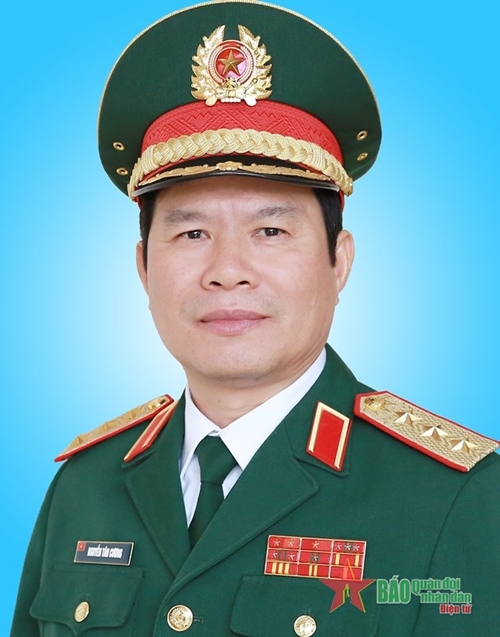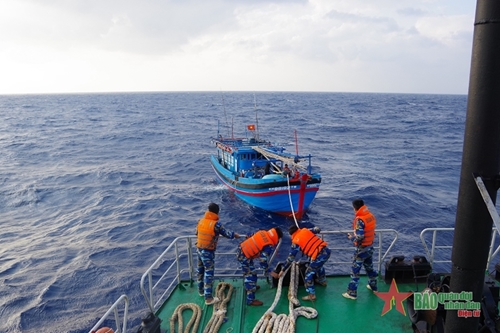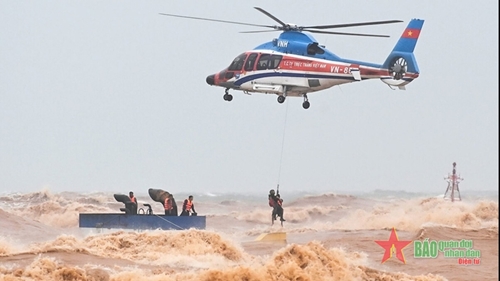Therefore, the building of the Law on Civil Defense at this time is very necessary, confirmed Sr. Lt. Gen. Nguyen Tan Cuong.
The chief of the General Staff of the Vietnam People’s Army, deputy defense minister, and head of the drafting committee of the draft Law on Civil Defense made that confirmation in an interview exclusively given to the People’s Army Newspaper.
In the conversation, General Cuong clarified the role, necessity, and connotation of the bill which was presented at the fourth session of the 15th National Assembly (N.A.) by Defense Minister General Phan Van Giang on October 26 and verified by Chairman of the N.A. Defense and Security Committee Le Tan Toi. As scheduled, N.A. deputies will discuss and give opinions on this bill.
    |
 |
|
Sr. Lt. Gen. Nguyen Tan Cuong |
According to General Cuong, there are four reasons to build this draft at this time. Firstly, it is to institutionalize the Party's guideline and standpoints in resolutions and directives on building and perfecting the law on civil defense, such as the Politburo’s Resolution No.28 dated September 22, 2008 on continuing to build provinces and centrally-run cities into strong defensive areas in the new situation and the Politburo’s Resolution No.22 dated August 30, 2022 on civil defense by 2030 and the following years, which clearly demonstrates the prompt development of the Law on Civil Defense, review, supplementation and perfection of legal documents on civil defense to meet the civil defense requirements and duties in the new situation.
Secondly, it is to ensure the accurate realization of Constitution 2013’s provisions. In particular, Constitution 2013 stipulates that safeguarding the socialist Vietnam is the cause of the entire people, and that agencies, organizations and citizens must fully perform defense and security duties. Civil defense is included in the mission of defense and security and Fatherland protection; thus, it should be institutionalized into law.
    |
 |
|
Naval troops implementing search and rescue missions |
In other words, regulations on civil defense related to human rights and citizens' rights need to be prescribed in legal documents to ensure the constitutional principle of human rights and citizens' rights can only be restricted according to the provisions of law in case of necessity for reasons of national defense and security, social order and safety, social ethics, and public health.
Thirdly, in recent years, civil defense work has greatly contributed to protecting people's lives, health and property, creating a stable environment for socio-economic development. However, the current law does not clearly define response measures according to civil defense levels, resulting in difficulties in implementation.
Fourthly, the domestic, regional and international situations have placed increasing demands on civil defense work, requiring the perfection of the legal system, creating a strong legal basis for the settlement of war legacy, prevention of disasters, incidents, and diseases, and protection of people, agencies, organizations and national economy, as well as assurance of security and safety for the nation.
    |
 |
|
Rescueing members on Vietship 01 on October 2020 |
According to General Cuong, to avoid overlapping in the legal system, and ensure easiness in understanding and implementation, the draft Law on Civil Defense only stipulates general contents and measures related to civil defense activities to meet the real situation and some new issues that other laws have not yet provided for such as development of civil defense related strategies, plans and levels and response measures in each civil defense level, operations of civil defense in a state of emergency and a state of war, and civil defense activities in Vietnam’s waters that are not under the management of provincial people's committee.
It also legalizes measures that have not been prescribed by law; however, due to urgent requirements, they have been applied and brought into play effectively in practice. These measures include social distancing, forced evacuation of people and property to ensure safety, social security policies, economic recovery, among others.
Regarding the definition of civil defense levels in the bill, the deputy defense minister said that it is made based on four specific and clear criteria: The scope of influence and the possibility of spreading of disasters, and incidents at risk of leading to disasters; natural geographical and socio-economic characteristics of the locality affected by disasters or incidents; developments and possibility of causing damages due to disasters and incidents; and local authorities and civil defense-participating forces’ capability to respond to disasters and incidents.
General Cuong verified that the first three criteria are objective and united with risk levels stipulated in civil defense-related laws. The fourth criteria is vital and necessary to define the level of risks and damage that other laws have not prescribed. So, the bill with civil defense levels is consistent with current laws and additional contents that have not been stipulated in other laws, ensuring more uniformity and comprehensiveness.
Asked about the agency that commands and directs the civil defense work, General Cuong said that it is an interdisciplinary organization. In particular, the National Steering Committee for Civil Defense is established on the basis of merging the National Steering Committee for Civil Defense, the National Steering Committee for Natural Disaster Prevention and Control, and the National Committee for Incident and Disaster Response and Search and Rescue. The committee is headed by the Prime Minister, its members are ministers, heads of ministerial-level agencies in charge of civil-defense specialty and professional expertise.
He also talked about the formation of civil defense command agencies at ministerial and locality levels with duties for their heads and those performing staff role.
Deputy Defense Minister Sr. Lt. Gen. Nguyen Tan Cuong underlined that the civil defense command and directing agencies have elite and compact apparatus; authorized agencies are clear; and role of agencies in charge of civil-defense related specialty and professional expertise is promoted.
Translated by Mai Huong